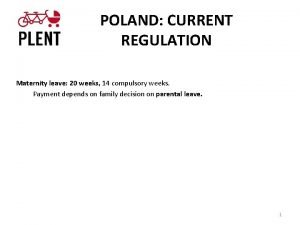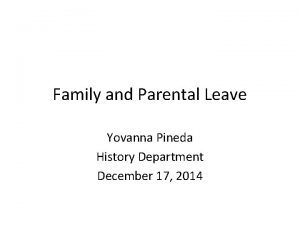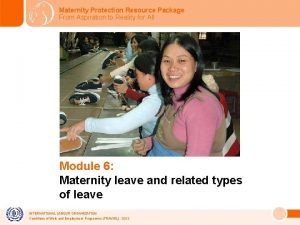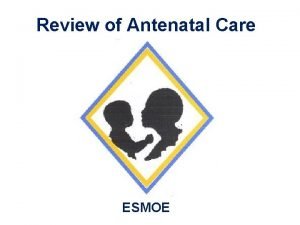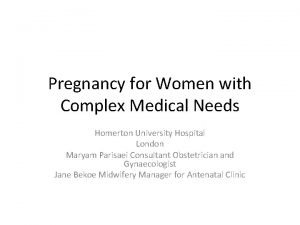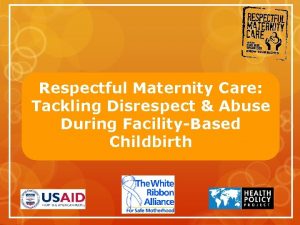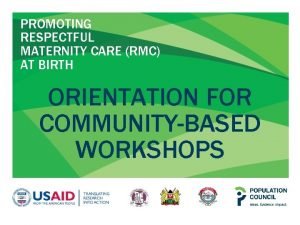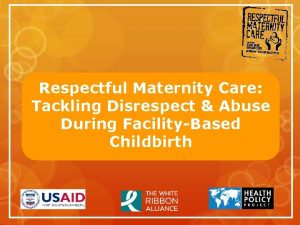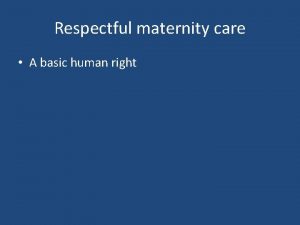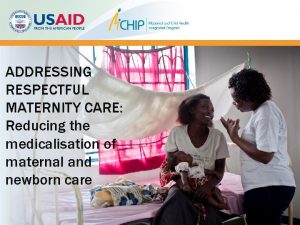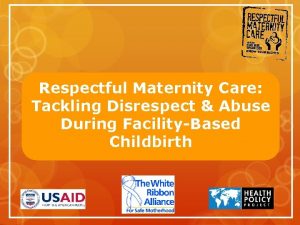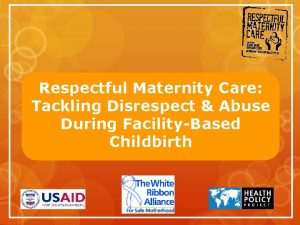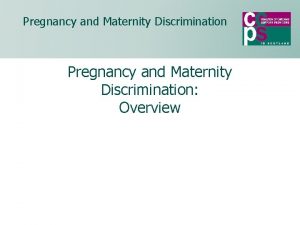RESPECTFUL MATERNITY CARE A Worthwhile Investment for Health


















- Slides: 18

RESPECTFUL MATERNITY CARE: A Worthwhile Investment for Health Care Services, Professionals, Clients and Communities General Concepts and Considerations May 2013

General and Specific Session Objectives § General Objective: To share information concerning Respectful Maternity Care (RMC) and its promotion § Specific Objectives: § Define Respectful Maternity Care § Describe the content of RMC § Describe avenues for promotion of RMC § Present key recommendations 2

Respectful Maternity Care: General Concept § “Respectful Maternity Care” (RMC) is an approach that: § Focuses on the interpersonal aspect of maternity care § Emphasizes the fundamental rights of the mother, newborn and families, including protecting the mother-baby pair § Recognizes that all childbearing women need and deserve respectful care and protection of the women’s right to choice and preferences 3

Rights in Respectful Maternity Care Type of Abuse and Disrespect 1. Physical abuse 2. Non‐consented care Human Right in Maternity Care Freedom from harm and ill treatment Right to information, informed consent and refusal, and respect for choices and preferences, including the right to companionship of choice wherever possible 3. Non‐confidential care 4. Non‐dignified care (including verbal abuse) Confidentiality, privacy Dignity, respect 5. Discrimination based on specific attributes Equality, freedom from discrimination, equitable care 6. Abandonment or denial of care 7. Detention in facilities Right to timely healthcare and to the highest attainable level of health Liberty, autonomy, self‐determination, and freedom from coercion Source: Bowser and Hill 2010

Characteristics of Healthcare to be Avoided § Impersonal § Centered on the professional and not on the woman and her family § Disempowerment of the woman § Family unit separated during labor and birth 5

Respectful Maternity Care Promotes: § Respect for beliefs, traditions and culture § Empowerment of the woman and her family to become active participants in health care § Continuous support during labor § Choice of companion during labor and birth § The right to information and privacy § Freedom of movement during labor 6

RMC Promotes (continued): § Choice of position during birth § Good communication between client and provider § Support of the mother-baby pair § Improvement of working conditions and respectful and collaborative relationships among all cadres of health workers § Prevention of disrespect and abuse and institutional violence against woman 7

Respectful Maternity Care Can Be Life-Saving § RMC is lifesaving— women may refuse to seek care from a provider who abuses them or does not treat them well, even if the provider is skilled in preventing and managing complications (ACCESS Program. 2008. Best Practices in MN Care: LRP) 8

Historic Background 1975 Birth of the Humanizing Childbirth movement (Brazil) 1985 WHO/PAHO conference on appropriate technology for birth (Brazil) 1996 Mother-Friendly Childbirth Initiative (USA) 2000 First international conference on Humanizing Childbirth in Fortaleza (Brazil) 2010 USAID/URC–supported Landscape Analysis on abuse and disrespect in childbirth care 2011 Respectful maternity care charter, White Ribbon Alliance (WRA)

Respectful Maternity Care Charter

Respectful Maternity Care: Recognizes Multiple Stakeholders § Respect for women’s rights and preferences § Appreciation, compensation and respect for health care providers § Central involvement of women – community and national leaders – in planning and evaluating maternal health programs 11

Key Stakeholders in RMC § Pregnant women § Families § Communities Women’s Advocates Human Rights Activists RESPECTFU L MATERNITY CARE Policy Makers Donors 12 Healthcare Providers § Individual providers § Professional associations Training Institutions

Contributors to and Impact of Disrespect and Abuse in Childbirth on Skilled Care Utilization Source: Hill K and Stanton ME, 2010

Key Action Points POLICY RESEARCH LEGAL ACTION ADVOCACY EDUCATION COMMUNITY/ SOCIAL ACTIVISM SERVICE DELIVERY HEALTH SYSTEM 14

General Recommendations § Include advocacy at all levels to create functional networks among the wider body of stakeholders § Involve community and media in each step of the process § Where data is absent, conduct studies on women’s preferences and choices related to respectful maternity care § Ensure political commitment at the national, district and local levels so that appropriate policies and standards are in place. 16

General Recommendations (continued) § Professionals and communities should collaborate in all planning, implementation, and evaluation of RMC § Knowledge, skills and attitudes that support RMC must be required in all education and training programs that involve healthcare workers § Mobilize resources to support implementation of RMC 17

WE ALL HAVE A ROLE IN ASSURING THAT ALL WOMEN HAVE RMC! THANKS!

References § Bowser and Hill. 2010. "Exploring Evidence and Action for Respectful Care at Birth”. USAID, TRAction Project. § Hill K. and M. E. Stanton. 2010. Promoting Evidence and Action for Respectful Care at Birth, a presentation at the USAID Mini-University at Georgetown University. § ACCESS Program. 2008. Best Practices in Maternal and Newborn Care: Learning Resource Package. Module 4: Women-friendly Care. Jhpiego: Baltimore-MD, USA. § White Ribbon Alliance website: http: //www. whiteribbonalliance. org/ § URC website: http: //www. urc-chs. com/ 18
 Worthwhile content
Worthwhile content Sedgwick walmart
Sedgwick walmart Ar 600-8-10 leaves and passes
Ar 600-8-10 leaves and passes Legislation related to maternity benefits
Legislation related to maternity benefits Objectives of maternity ward
Objectives of maternity ward Wessex maternity academy
Wessex maternity academy Maternity leave poland
Maternity leave poland Early obstetric warning system chart
Early obstetric warning system chart Ut austin maternity leave
Ut austin maternity leave Why is maternity leave important
Why is maternity leave important Maternity bitmoji
Maternity bitmoji Maternity benefit act 1961 notes
Maternity benefit act 1961 notes Anc card
Anc card There is a practical joker in the maternity ward
There is a practical joker in the maternity ward Woman within maternity
Woman within maternity Homerton maternity helpline
Homerton maternity helpline Female nude for the decoration of bristol club
Female nude for the decoration of bristol club Fixed investment and inventory investment
Fixed investment and inventory investment Acceptable negative prefix
Acceptable negative prefix






